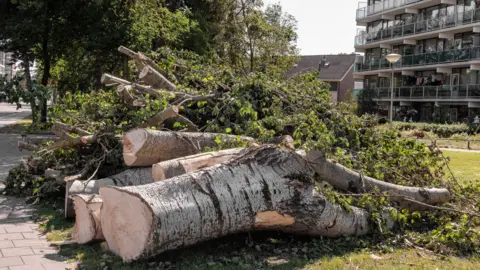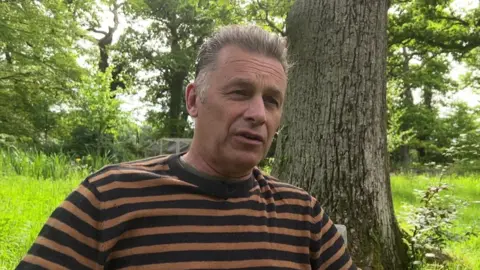Protected trees felled to save money, group says
 Getty Images
Getty ImagesProtected trees are being felled as a "cheap and easy option" in subsidence claims, an arboricultural group has said.
The London Tree Officers Association (LTOA) said trees were being felled across the country because councils were afraid of being liable for expensive property repairs.
Councils in England have given permission to fell more than 1,000 trees which previously had Tree Preservation Orders (TPOs).
A Ministry of Housing, Communities and Local Government Spokesperson said applications to address tree-related subsidence damage must be supported by appropriate information, with other factors eliminated as far as possible.
The BBC analysed 143 Freedom of Information request responses from councils in England. Of those, 10 directly provided figures for the financial years between 2019 and 2024, showing permission was granted to fell 1,403 previously protected trees.
TV presenter and naturalist Chris Packham said he was "horrified" by the idea that TPOs could be "rendered useless... on account of someone's crumbling conservatory".
He said: “What we’re losing is big, established mature trees. We’ve got to hang on to those at all cost.
“Ultimately this is about money. And there is no reason why, in one of the most deforested selection of countries anywhere in Europe, our government didn’t ought to be subsidising those councils to protect them against any economic losses that they suffer on account of needing to manage trees."

Local authorities could be liable for compensation if they refuse permission to fell a tree that is later blamed for causing problems such as subsidence.
Solicitor Sarah Dodd, from Barry-based firm Tree Law, said councils sometimes "panicked" when faced with an application to fell a protected tree.
She said: "They'll be told the worst case scenario - 'It's going to cost us a hundred thousand'.
"So then they're thinking: 'We haven't got a budget, we're cash-strapped. Where do we get a hundred thousand pounds from?'"
Jeremy Barrell, a registered tree consultant based in Fordingbridge, Hampshire, said some home insurance companies were "holding a gun to councils' heads".
He explained: "They say: 'We think the tree is causing damage to the building. If you don't let us cut the tree down or deal with it, then you will be responsible for any damage.'
"And that's quite frightening for local authorities."

Two councils told the BBC they had no money to cover large subsidence claims.
South Gloucestershire Council said: "Due to budget constraints it is unlikely we would have the necessary funds to cover compensation.
"Therefore consent to fell the tree would be issued as a last resort.”
Fareham Borough Council in Hampshire said it had allowed 135 out of 144 felling applications in the past two years and had no budget for compensation claims.
Its leader Simon Martin wrote to the government in 2024, urging new laws to allow councils to defend TPOs.
Fareham and Waterlooville MP and former Home Secretary Suella Braverman also previously called for change, saying: "Insurance companies have pressured local authorities into felling perfectly healthy trees with Tree Preservation Orders at the first point of contact."
LTOA executive member Andy Tipping said councils were "100%" influenced by money when making decisions on applications to fell protected trees.
He said the case of the Peterborough oak, which was felled in 2022, was an example where "the council was terrified of the cost of underpinning and allowed it to be removed".
He added: "Most of the time, it's a cheap and easy option and seen as removing risk."
In another case in February 2025, Enfield Council successfully defended itself from a £144,000 claim for damage to a house.
The Lands Tribunal found there was insufficient evidence to link subsidence to a nearby oak tree.
Chartered surveyor Ian Brett-Pitt said the case showed that unreasonable felling applications could be resisted.
Mr Tipping, Mr Brett-Pitt and Ms Dodd are part of a team which is about to publish a revised agreement with insurance companies - the Joint Mitigation Protocol - on best practice in subsidence cases.
The Association of British Insurers previously said felling was not its default solution to protect homes.
In a statement, it said: "Insurers understand concerns with tree felling, and they will assess each claim on a case-by-case basis, striking a balance between preserving greenery while ensuring that property owners are protected.
"Sometimes there are alternative solutions, such as introducing tree-root barriers, or tree reductions, but these are not always possible due to space and the proximity of a tree to a property."
The Ministry of Housing, Communities and Local Government spokesperson said: "There are existing procedures designed to support options other than felling.
"We have published guidance that makes it clear that applications to address tree-related subsidence damage must be supported by appropriate information, and that other factors have been eliminated as far as possible."
The BBC received direct figures in FOI responses from councils in Amber Valley, Basildon, Breckland, Colchester, Dartford, Dorset, Epping Forest, New Forest, Oadby and Wigston and West Berkshire.
Additional reporting by Alix Hattenstone
